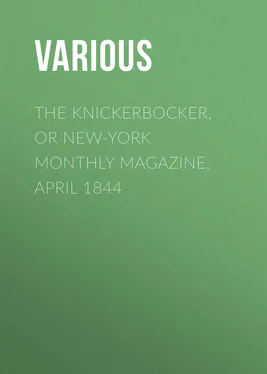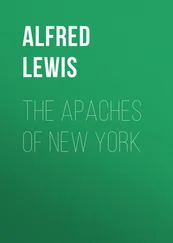Various - The Knickerbocker, or New-York Monthly Magazine, April 1844
Здесь есть возможность читать онлайн «Various - The Knickerbocker, or New-York Monthly Magazine, April 1844» — ознакомительный отрывок электронной книги совершенно бесплатно, а после прочтения отрывка купить полную версию. В некоторых случаях можно слушать аудио, скачать через торрент в формате fb2 и присутствует краткое содержание. Жанр: foreign_antique, periodic, foreign_edu, на английском языке. Описание произведения, (предисловие) а так же отзывы посетителей доступны на портале библиотеки ЛибКат.
- Название:The Knickerbocker, or New-York Monthly Magazine, April 1844
- Автор:
- Жанр:
- Год:неизвестен
- ISBN:нет данных
- Рейтинг книги:4 / 5. Голосов: 1
-
Избранное:Добавить в избранное
- Отзывы:
-
Ваша оценка:
- 80
- 1
- 2
- 3
- 4
- 5
The Knickerbocker, or New-York Monthly Magazine, April 1844: краткое содержание, описание и аннотация
Предлагаем к чтению аннотацию, описание, краткое содержание или предисловие (зависит от того, что написал сам автор книги «The Knickerbocker, or New-York Monthly Magazine, April 1844»). Если вы не нашли необходимую информацию о книге — напишите в комментариях, мы постараемся отыскать её.
The Knickerbocker, or New-York Monthly Magazine, April 1844 — читать онлайн ознакомительный отрывок
Ниже представлен текст книги, разбитый по страницам. Система сохранения места последней прочитанной страницы, позволяет с удобством читать онлайн бесплатно книгу «The Knickerbocker, or New-York Monthly Magazine, April 1844», без необходимости каждый раз заново искать на чём Вы остановились. Поставьте закладку, и сможете в любой момент перейти на страницу, на которой закончили чтение.
Интервал:
Закладка:
Later times have added to the social and literary lustre of Penshurst. It has been still farther illustrated by the talents and fame of Algernon Sydney, whose name never fails to awaken the sympathies of every friend of liberty for his honorable labors and unhappy fate. It has numbered among its guests and its eulogists such men as Jonson, Waller, and Southey; finally, even in our own time it has seen its horizon momently illuminated by the brief but dazzling splendors of the poet Shelly. This last was of the lineage of Sydney, and shared the talents and proud integrity, but not the wisdom and milder virtues of his house. It only remains to say, that the dwelling and estate of the Sydneys has passed into other hands, but finds, it would seem, in Lord De Lisle a proprietor not insensible to the worth nor regardless of the memory of his far-famed predecessors.
Thus the remarks intended, draw to an end. We leave the halls of Penshurst, and the gates of that venerated mansion close behind us forever. Even thus did they close ages ago upon him, the light and honor of that ancient house, who, leaving it in the glow of health, in the pride of manly beauty, in the aspirations of a high but not a haughty spirit, was destined never to cross that paternal threshold more. The blessings that went with him have mouldered on the lips that pronounced them; the tears that mourned his fall have dried upon the lids from which they streamed; all who knew and loved, all who watched and wept for Sir Philip Sydney are silent in the dust to which he himself has long been gathered. Yet does not his spirit commune with ours as we tread the halls once familiar with his presence, or gaze upon those all but animated portraits which Penshurst still numbers among the richest of its treasures? Does nothing survive here of so much honor, so much courtesy, so much courage, to elevate us by its example and to inspire us with new hope, ere we turn again to tread the toilsome mazes of the world? Let the acknowledgments of all those who with no unworthy or unreflecting spirit have traced these paths, reply; or rather let the answer embody itself in the words of a poet, who, while expressing his own sense of the merits of Sydney, has but given a suitable expression to sentiments which find an echo in every bosom:
‘Are days of old familiar to thy mind,
Oh reader? Hast thou let the midnight hour
Pass unperceiv’d, whilst thou in fancy lived
With high-born beauties and enamor’d chiefs,
Sharing their hopes, and with a breathless joy,
Whose expectation touched the verge of pain,
Following their dangerous fortunes? If such lore
Has ever thrill’d thy bosom, thou wilt tread
As with a pilgrim’s reverential thoughts
The groves of Penshurst. Sydney here was born,
Sydney, than whom no gentler, braver man
His own delightful genius ever feign’d,
Illustrating the vales of Arcady,
With courteous courage and with loyal loves.
Upon his natal day an acorn here
Was planted; it grew up a stately oak,
And in the beauty of its strength it stood
And flourished, when his perishable part
Had mouldered dust to dust. That stately oak
Itself hath perished now, but Sydney’s fame
Endureth in his own immortal works.’
ILLUSTRATIONS
Before the extension of commerce and manufactories in Europe, the hospitality of the rich and the great, from the sovereign down to the smallest baron, exceeded every thing which in the present times we can easily form a notion of. Westminster Hall was the dining-room of William Rufus, and might frequently perhaps not be too large for his company. It was reckoned a piece of magnificence in Thomas à Becket that he strewed the floor of his hall with clear hay or rushes in the season, in order that the knights and squires who could not get seats might not spoil their fine clothes when they sat down on the floor to eat their dinner. The great Earl of Warwick is said to have entertained every day, at his different manors, thirty thousand people; and though the number may have been exaggerated, it must however have been very great to admit of such exaggeration. The personal expenses of the great proprietors having gradually increased with the extension of commerce and manufactures, it was impossible that the number of their retainers should not as gradually diminish. Having sold their birth-right, not like Esau, for a mess of pottage in time of hunger and necessity, but in the wantonness of plenty for trinkets and baubles, fitter to be the play-things of children than the serious pursuits of men, they became as insignificant as any substantial burgher or tradesmen in a city.
Wealth of Nations: Book iii., Chap. iv.The planta-genista or broom having been ordinarily used for strewing floors, became an emblem of humility, and was borne as such by Fulke, Earl of Anjou, grandfather of Henry II., King of England, in his pilgrimage to the Holy Land. The name of the royal house of Plantagenet is said to be derived from this circumstance.
Hunt’s Exemplars of Tudor Architecture.Eleven continued to be the dining hour of the nobility, down to the middle of the seventeenth century, though it was still kept up to ten o’clock in the Universities, where the established system is not so easily altered as in private families. ••• The lord and his principal guests sate at the upper end of the first table, which was therefore called the lord’s board-end. The officers of his household and inferior guests at long tables below in the hall. In the middle of each table stood a great salt-cellar, and as particular care was taken to place the guests according to their rank, it became a mark of distinction whether a person sate above or below the salt. ••• Pewter plates in the reign of Henry VIII. were too costly to be used in common by the highest nobility. In Rymer’s Fœdera is a license granted in 1430 for a ship to carry certain commodities for the express use of the King of Scotland, among which are particularly mentioned a supply of pewter dishes and wooden trenchers. ‘ Octo duodenis vasorum de pewter, mille et ducentis ciphis ligneis. ’
Archæologia.The use of forks did not prevail in England till the reign of James I.
Coryat.In the list of birds served up to table were many fowls which are now discarded as little better than rank carrion, such as cranes, lapwings, sea-gulls, bitterns, ruffs, kerlews, etc.
Grose’s Antiq. Repertory.The use of coaches is said to have been first introduced into England by Fitz-Allan, earl of Arundel, A. D. 1580. Before that time ladies chiefly rode on horseback, either single on their palfreys, or double, behind some person on a pillion. In cases of sickness or bad weather, they had horse-litters and vehicles called chairs, or carrs, or charres. Glazed windows were introduced into England, A. D. 1180.
Anderson’s History of Commerce.The ceilings of that part of Wresill Castle left standing by the Commonwealth’s soldiers still appear richly carved, and the sides of the rooms are ornamented with a great profusion of ancient sculpture finely executed in wood, exhibiting the ancient bearings, crests, badges and devices of the Percy family, in a great variety of forms, set off with all the advantages of painting, gilding and imagery. ••• Noblemen in Henry the Eighth’s time were obliged to carry all the beds, hangings and furniture with them when they removed. The usual manner of hanging the rooms in the old castles was only to cover the naked walls with tapestry or arras hung upon tenter hooks, from which they were easily taken down upon every removal. On such an occasion the number of carts employed in a considerable family must have formed a caravan nearly as large as those which traverse the deserts of the East. ••• At the time of the Northumberland House-hold book, glass, though it had perhaps been long applied to the decorating churches, was not very commonly used in dwelling-houses or castles.
Читать дальшеИнтервал:
Закладка:
Похожие книги на «The Knickerbocker, or New-York Monthly Magazine, April 1844»
Представляем Вашему вниманию похожие книги на «The Knickerbocker, or New-York Monthly Magazine, April 1844» списком для выбора. Мы отобрали схожую по названию и смыслу литературу в надежде предоставить читателям больше вариантов отыскать новые, интересные, ещё непрочитанные произведения.
Обсуждение, отзывы о книге «The Knickerbocker, or New-York Monthly Magazine, April 1844» и просто собственные мнения читателей. Оставьте ваши комментарии, напишите, что Вы думаете о произведении, его смысле или главных героях. Укажите что конкретно понравилось, а что нет, и почему Вы так считаете.












